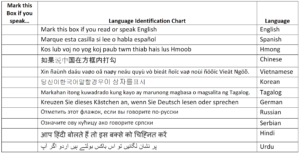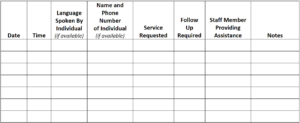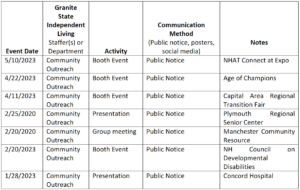Granite State Independent Living
November 2023
The Granite State Independent Living Title VI plan includes the following elements:
1. Plan Approval, Annual Certifications and Assurances, Revision Log
2. Policy Statement
3. Notice to the Public
4. Complaint Procedure
5. Complaint Form
6. List of transit related Title VI Investigations, Complaints and Lawsuits
7. Public Participation Plan
8. Language Assistance Plan
9. Minority Representation Table and Description
10. Providing Assistance to and Monitoring Subrecipients
11. Title VI Equity Analysis for Facility Acquisition
12. Fixed Route Transit Provider Requirements
Section 1: Title VI Plan Approval & Compliance Requirements
Annual Certifications and Assurances
In accordance with 49 CFR Section 21.7(a), every application for financial assistance from FTA must be accompanied by an assurance that the applicant will carry out the program in compliance with Title VI regulations. This requirement shall be fulfilled when the applicant/recipient submits its annual certifications and assurances. Primary recipients will collect Title VI assurances from sub–recipients prior to passing through FTA funds.
Granite State Independent Living will remain in compliance with this requirement by annual submissionof certifications and assurances as required by NHDOT.The date of last submission of these certifications and assurances (at the time of this Plan’s approval) is: January 1, 2023.
Title VI Plan Revision Log
August 1, 2020 – All Sections Revised –

Section 2: Title VI Policy Statement
Policy Statement
Granite State Independent Living, operating as a demand response transit provider, as a recipient of Federal Transit Administration (FTA) grant dollars either directly from FTA or through the New Hampshire Department of Transportation (NHDOT), will comply with the Title VI of the Civil Rights Act of 1964 (42 U.S.C. 2000d), the U.S. Department of Transportation implementing regulations, FTA Circular 4702.1B, and NHDOT Public Transportation requirements as specified in Master Grant Agreement, and State Management Plan. Granite State Independent Living operates its programs and services without regard to race, color, and national origin in accordance with Title VI of the Civil Rights Act.
Section 3: Notice to the Public
Title VI Notice to the Public
Granite State Independent Living Notice to the Public is as follows:
Notifying the Public of Rights Under Title VI
• Granite State Independent Living operates its programs and services without regard to race, color, and national origin in accordance with Title VI of the Civil Rights Act. Any person who believes she or he has been aggrieved by any unlawful discriminatory practice under Title VI may file a complaint with Granite State Independent Living.
• For more information on Granite State Independent Living’s civil rights program, the procedures to file a complaint, or to file a complaint, please contact Deb Ritcey, CEO at (603)228–9680, d[email protected] or visit our administrative office at 21 Chenell Dr. Concord, NH 03301. For more information, visit www.gsil.org
• For transportation–related Title VI matters, a complaint may also be filed directly with the:
New Hampshire Department of Transportation, Attn: Shannon Aiton, Title VI Coordinator, PO Box 483, 7 Hazen Drive Concord, NH 03302–0483; 603–271–2467; TTY: 800–735–2964; [email protected]
Federal Transit Administration, Office of Civil Rights, Attention: Complaint Team, East Building, 5th Floor–TCR, 1200 New Jersey Ave., SE Washington, DC, 20590.
• If information is needed in another language, contact 603–228–9680
Notificación al público de los derechos bajo Título VI
• Granite State Independent Living opera sus programas y servicios sin distinción de raza, color u origen nacional de acuerdo con Título VI de la Ley de Derechos Civiles. Cualquier persona que crea que ha sido resentido por cualquier práctica discriminatoria ilegal según el Título VI puede presentar una queja ante Granite State Independent Living.
• Para obtener más información sobre el programa de derechos civiles de Granite State Independent Living, los procedimientos y para presentar una queja, comuníquese con Deb Ritcey, directora ejecutiva al (603)228–9680, [email protected] o visite nuestra oficina administrativa en 21 Chenell Dr. Concord, NH 03301. Para obtener más información, visite www.gsil.org
• Si necesita información en otro idioma, llame a 603–228–9680
Section 4: Title VI Complaint Procedure
Granite State Independent Living’s Title VI Complaint Procedure is made available in the following locations:
☒ Agency website: www.gsil.org
☒ Hard copy in the Concord office
☒ Agency Title VI Plan
Any individual, group of individuals or entity that believes they have been discriminated against based on race, color, or national origin by Granite State Independent Living may file a Title VI complaint by completing and submitting the agency’s Title VI Complaint Form to the Compliance Officer.
Any individual having filed a complaint or participated in the investigation of a complaint shall not be subjected to any form of intimidation or retaliation. Individuals who have cause to think that they have been subjected to intimidation or retaliation can file a complaint of retaliation following the same procedure for filing a discrimination complaint.
A complaint must be filed with Granite State Independent Living no later than 180 days after the following:
1. The date of the alleged act of discrimination; or
2. The date when the person(s) became aware of the alleged discrimination; or
3. Where there has been a continuing course of conduct, the date on which that conduct was discontinued of the latest instance of the conduct.
Once the complaint is received, Granite State Independent Living will review it to determine if our office has jurisdiction. A copy of each Title VI complaint received will be forwarded to the New Hampshire Department of Transportation within ten (10) calendar days of receipt. The complainant will receive an acknowledgement letter informing her/him whether the complaint will be investigated by our office.
Granite State Independent Living has 45 days to investigate the complaint. If more information is needed to resolve the case, Granite State Independent Living may contact the complainant requesting further information. The complainant has 30 business days from the date of the letter to send requested information to the investigator assigned to the case. If the investigator is not contacted by the complainant or does not receive the additional information within 30 business days, Granite State Independent Living can administratively close the case.
After the investigator reviews the complaint, the agency will issue one of two (2) letters to the complainant: a closure letter or a letter of finding (LOF).
- A closure letter summarizes the allegations and states that there was not a Title VI violation and that the case will be closed
- A letter of finding (LOF) summarizes the allegations and the interviews regarding the alleged incident, and explains whether any disciplinary action, additional training of the staff member, or other action will occur.
If the complainant wishes to appeal the decision it must direct the appeal to the agency initially. The complainant has 10 days after the date of the closure letter or the letter of finding to do so. If there is outstanding concern, the appeal may be directed to the state DOT or FTA. The appeal process information will be included in the letter.
A person may also file a complaint directly with the: New Hampshire Department of Transportation, Attn: Shannon Aiton, Title VI Coordinator, PO Box 483, 7 Hazen Drive Concord, NH 03302-0483; 603-271-2467; TTY: 800-735-2964; [email protected]
Or
Federal Transit Administration, Office of Civil Rights, Attention: Complaint Team, East Building, 5th Floor-TCR, 1200 New Jersey Ave., SE Washington, DC, 20590.
If information is needed in another language, then contact (603)228-9680.
Section 5: Title VI Complaint Form
Granite State Independent Living’s Title VI Complaint Procedure is made available in the following
locations:
☒ Agency website: www.gsil.org
☒ Hard copy in the central office
☒ Agency Title VI Plan
Section 6: List of Transit Related Title VI Investigations, Complaints and Lawsuits
Granite State Independent Living maintains a list or log of all Title VI investigations, complaints, and
lawsuits, pertaining to its transit–related activities.
Section 7: Public Participation Plan
Strategies and Desired Outcomes
To promote inclusive public participation, Granite State Independent Living will employ the following strategies, as appropriate (make these determinations based on a demographic analysis of the population(s) affected, type of plan, program and/or service under consideration, and the resources available):
✓ Provide for early, frequent, and continuous engagement by the public
✓ Select accessible and varied meeting locations and times
✓ Employ different meeting sizes and formats
✓ Use social media in addition to other resources as a way to gain public involvement
✓ Use radio, television, or newspaper ads on stations and in publications that serve LEP populations. Outreach to LEP populations may also include audio programming available on podcasts.
community centers, libraries, faith–based institutions, local festivals, etc.
Public Outreach Activities
The public outreach and involvement activities conducted by Granite State Independent Living since the last Title VI Program submission are summarized in the table below.
Specific Public Participation activities are listed in the table below:
Section 8: Language Assistance Plan
Plan Components
Limited English Proficient (LEP) refers to persons for whom English is not their primary language and who have a limited ability to read, write, speak, or understand English. This includes those who have reported to the U.S. Census that they speak English less than very well, not well, or not at all.
The Granite State Independent Living Language Assistance Plan includes the following elements:
- Item #1: The results of the Four Factor Analysis, including a description of the LEP population(s),
served. - Item #2: A description of how language assistance services are provided by language
- Item #3: A description of how LEP persons are informed of the availability of language assistance service
- Item #4: A description of how the language assistance plan is monitored and updated
- Item #5: A description of how employees are trained to provide language assistance to LEP persons
Four Factor Analysis Methodology
To determine if an individual is entitled to language assistance and what specific services are appropriate, Granite State Independent Living has conducted a Four Factor Analysis of the following areas: 1) Limited– English Proficient (LEP) Speaker Demography, 2) Contact Frequency, 3) Importance of Service, and 4) Resources and Costs.
Factor 1: The number or proportion of LEP persons eligible to be served or likely to be encountered by the program or recipient. In addition to the number or proportion of LEP persons served, Granite State independent Living will identify:
(a) How LEP persons interact with the recipient’s agency;
(b) Identification of LEP communities, and assessing the number or proportion of LEP persons from
each language group to determine the appropriate language services for each language;
(c) The literacy skills of LEP populations in their native languages, in order to determine whether
translation of documents will be an effective practice; and
(d) Whether LEP persons are underserved by the recipient due to language barriers.
Factor 2: The frequency with which LEP persons come into contact with the program: Identifies and assesses the frequency Granite State Independent Living’s staff comes into contact with LEP persons. Examples of contact could include:
(a) Use of bus and rail service;
(b) Purchase of tickets through vending machines, outlets, websites, and over the phone;
(c) Participation in public meetings;
(d) Customer service interactions;
(e) Ridership surveys;
(f) Operator surveys.
Factor 3: The nature and importance of the program, activity, or service provided by the program to people’s lives. Generally speaking, the more important the program, the more frequent the contact and the likelihood that language services will be needed.
Factor 4: The resources available to the recipient for LEP outreach, as well as the costs associated with that outreach. Resource and cost issues can often be reduced by technological advances, reasonable business practices, and the sharing of language assistance materials and services among and between recipients, advocacy groups, LEP populations and Federal agencies. Large entities and those entities serving a significant number of LEP persons should ensure that their resource limitations are well substantiated before using this factor as a reason to limit language assistance.
Item #1 –Results of the Four Factor Analysis (including a description of the LEP population(s) served)
Factor 1: The number or proportion of LEP persons eligible to be served or likely to be encountered.
Of the 1,308,66 residents in the Granite State Independent Living service area, 31,406 residents describe themselves as speaking English less than “very well”. For the Granite State Independent Living service area, the latest U.S. Census Bureau data shows that among the area’s population 2.40% speak English “less than very well.” For these groups who speak English “less than very well”, 0.83% speak Spanish. See detailed table.
All of Granite State Independent Living’s programs are important; however, those related to safety, nondiscrimination, and public involvement are among the most important. Granite State Independent Living is committed to providing meaningful access and will provide written translation for any of its documents, when reasonable, effective and with the available resources. In other cases, Granite State Independent Living will strive to provide alternative but meaningfully accessibility. Moreover, Granite State Independent living continually evaluates its programs, services, and activities to ensure that persons who may be LEP are always provided with meaningful access. The Title VI policy, complaint form, and LEP policy are available in insert languages(s) upon request.
Outcomes: As mentioned above, there is no way to determine both the Limited English Proficient and disabled/eligible for service population beyond gross approximation. Through other inclusion factors including open board meetings, available translation services, interaction with family members and care–providers that may be able to translate, and the small (to non– existent) number of existing transactions where language in a barrier, GSIL provides adequate opportunity for people with limited English proficiency to obtain service and influence service– related decisions.
Granite State Independent Living Transportation Dept. distributed a language survey to all consumers. The objective of the survey was to evaluate the needs of GSIL customers who are not able to communicate in English. The first question asked, In What Way(s) Do You Interact with ABC riders? This chart illustrates the results.




Training Employees
Granite State Independent Living makes every effort to make its programs, services, and activities, accessible to LEP individuals. Granite State Independent Living will use available resources, both internal and external to accommodate reasonable requests for translations.
LEP Policy
Granite State Independent Living shall provide for communication for limited English proficient riders to ensure them equal opportunity to benefit from services. Family members or friends of limited English proficient riders will not be used as translators unless specifically requested by that individual. Arrangements have been made with the Language Bank to obtain translators. The agency will also utilize web–based translator programs if available.
Si usted necesita ayuda con el inglés, por favor llame 603–228–9680.
“I Speak” Language Identification Card


Section 9: Minority Representation Information
GSIL can speak and think with authority on behalf of the people we serve because we are led by a board of directors and staff of which over 51% are people with disabilities.
GSIL’s Services have been prepared to ensure that no one is precluded from participating in GSIL’s service planning and development process. We ensure that:
• Potentially affected consumers will have an appropriate opportunity to participate in decisions about a proposed activity that will affect their environment and/or health;
• The public’s contribution can and will influence GSIL’s decision making;
• The concerns of all participants involved will be considered in the decision–making process; and
• GSIL will seek out and facilitate the involvement of those potentially impacted by LEP.
A. Minority Representation Table
Table Depicting Membership of Board, Committees, Councils, Broken Down by Race:
Note: insert the number of people and % of total board membership
B. Efforts to Encourage Minority Participation
To encourage participation on its boards, committees, and councils, Granite State Independent living strives to be as inclusive as possible and is pleased to say 67% of our board members identify as a person living with a disability. The board is currently working on board diversification for other minorities.
Section 10: Providing Assistance to and Monitoring Subrecipients
☒ No, the agency does not have subrecipients.
☐ Yes. If yes, list the subrecipient names: (list other agency names here)
Insert Agency Name monitors subrecipients using the following process:
1. Granite State Independent Living uses the following process for ensuring all subrecipients are complying with the general reporting requirements of FTA Circular 4702.1B: (document the process here)
2. Granite State Independent Living collects Title VI programs from the subrecipients listed above and reviews programs for compliance by (list the process here)
Section 11: Title VI Equity Analysis for Facility Acquisition
Title 49 CFR, Appendix C, Section (3)(iv) requires “the location of projects requiring land acquisition and the displacement of persons from their residences and business may not be determined on the basis of race, color, or national origin.” For purposes of this requirement, “facilities” does not include bus shelters, as they are considered transit amenities. It also does not include transit stations, power substations, or any other project evaluated by the National Environmental Policy Act (NEPA) process. Facilities included in the provision include, but are not limited to, storage facilities, maintenance facilities, operations centers, etc. Has the agency built a facility? (check a response below)
☒ No, the agency has not built a facility.
☐ Yes, the agency has built a facility and completed a Title VI equity analysis to compare the equity impacts of various siting alternatives, and the analysis must occur before the selection of the preferred site. (Include at the end of the Title VI plan a copy of the Title VI equity analysis.)
Section 12: Fixed Route Transit Providers Service Standards and Policies
FTA Circular 4702.1B, Chapter III, Paragraph 10: All fixed route transit providers shall set service standards and policies for each specific fixed route mode of service they provide.
Granite State Independent Living:
☐ is a fixed route transit provider
☒ is not a fixed route transit provider



